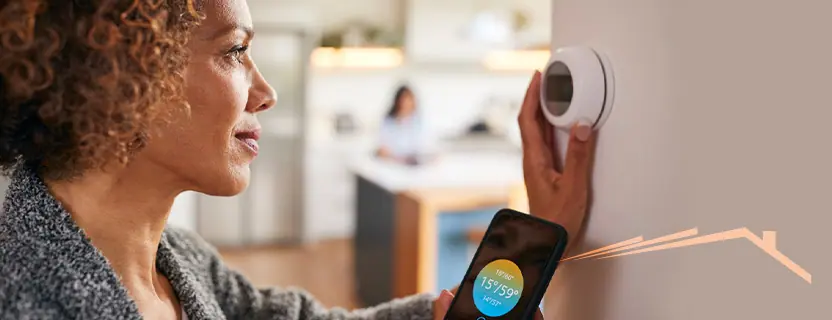
High levels of indoor humidity can make your home feel muggy and hot. Your space feels best when it is cool and dry, but how do you ensure there is not too much moisture in the air? And will your heating, air conditioning and ventilation (HVAC) system adequately keep your indoor space feeling its best in terms of how much water vapor is in the air?
Understanding the role of humid air indoors and proper HVAC humidity control will help you establish the most comfortable and livable environment possible for your family.
Humid air can wreak havoc in your indoor environment. Explore some of the issues that high levels of humidity in your home can cause below:
If you’re dealing with humidity issues in your home, the consequences for your property can be expensive. The moisture can negatively impact everything from wood furniture and floors to electronics, creating a space that is not conducive to your family’s normal daily activities. Too much moisture can also impact the integrity of wallpaper and paintwork. The water vapor particles can ruin anything that is moisture-sensitive, including items like books and art.
A huge con of having too much indoor humidity without proper ventilation is the potential for mold and mildew growth. Humid environments are ideal for them to thrive, and they can multiply very quickly if your space traps the wet air and things do not adequately dry out.
The moisture can also attract other unwanted pests, like cockroaches and dust mites. These infestations can ultimately pose a health hazard in your home.
High humidity levels can make your space feel especially uncomfortable. Think about coming inside after spending a few hours in the sun and the stark difference between stepping into a cool, dry environment versus a muggy one. The warm, moist air creates conditions in your home that make the space feel sticky and hotter than the actual indoor temperature.
Keeping your home dry will help you establish a comfortable and restful space for you and your family, improving your quality of life.
Another common result of having too much humidity in your home is energy inefficiencies. You could be wasting hundreds of dollars on your utility bills every year if your space is too moist. These types of environments require the HVAC’s cooling system to work in overdrive to bring the temperatures down. You may even find yourself putting your unit on a higher setting to adjust to the muggy, humid indoor air.
Excessive humidity in your home can lead to serious health concerns. The moisture promotes the growth of mold and mildew, which is unsightly and can ruin different parts of your house while also potentially causing respiratory issues and allergies.
The healthiest indoor space never exceeds a relative humidity level of more than 60%, as this is the maximum moisture content you can maintain before you begin experiencing negative implications from the humidity.
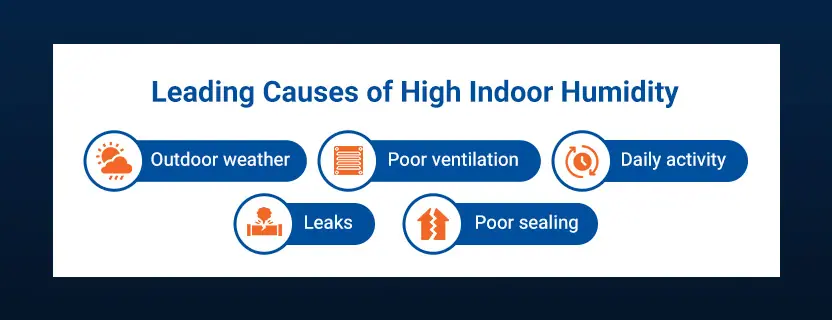
With an understanding that high levels of humidity can cause a wide range of problems in your home, it is important to explore the causes of that humidity. Once you know where the moisture is coming from and why it is trapped in your home, you can begin taking measures to mitigate it properly.
The following are common causes of high indoor humidity levels:
Yes! Today’s manufacturers design modern HVAC systems with specialized technology to regulate both indoor air temperatures and humidity levels. While the main function of most units is to control the ambient temperature control, many also remove excess humidity through the cooling process.
A well-maintained HVAC system will help you achieve the right relative humidity percentage for your indoor air and help you create a space that feels cool, dry and comfortable, even when the humidity outside is extremely high.
So, how exactly do most HVAC systems capture and remove excess water particles from the air inside your home? The answer is through their internal refrigerant system.
Hot indoor air is pulled through the unit’s vents and registers. Then it travels along the return ducts and eventually makes it over the evaporator coil. A refrigerant in that coil absorbs the heat. As the coolant travels through the unit’s condenser coil, it releases the heat, which allows the cooled refrigerant to pass the air back to the evaporator coil. The warm air mixed with the refrigerant creates condensation that drips into the condensate pan below before traveling through the drain line outside.
Ultimately, the humidity in your indoor air works through the HVAC unit to become condensation.
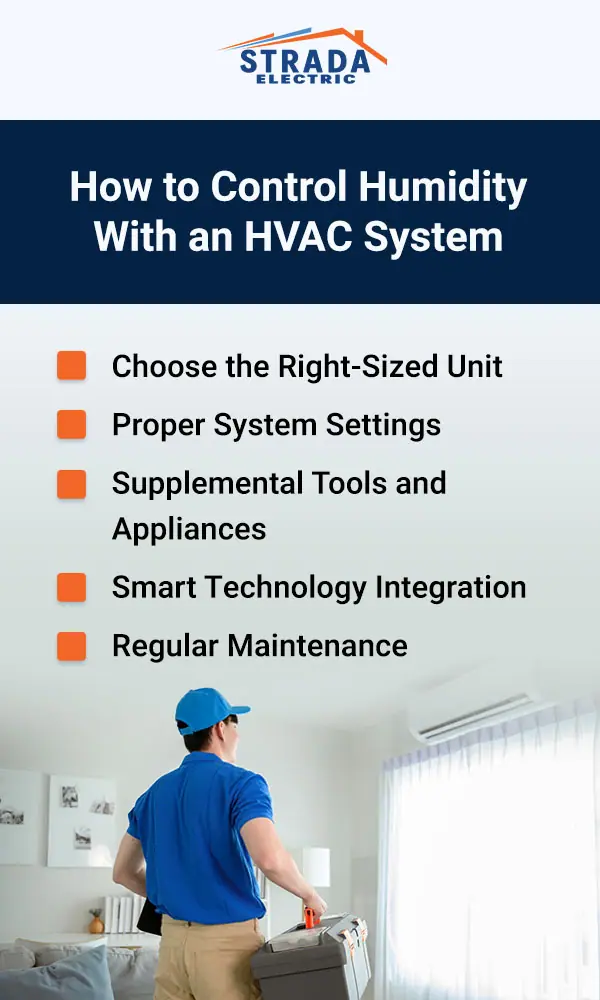
With a general understanding of how HVAC removes humidity from the environment, we are diving into the ways you can create the best indoor air conditions and support your unit’s efficiency and effectiveness.
Check out different methods you can use to control humidity with your HVAC unit:
If your house’s HVAC system is not correctly sized for your space, it can impact its ability to pull moisture out of the air.
An HVAC unit that is too large for your home can result in excessive indoor humidity. This occurs because the unit does not need to run long to adequately cool off your space. Since the system is running for a shorter period, it does have time to remove a lot of water vapor from your indoor air.
Another way to control humidity in your space with your HVAC system is by using the proper system settings. Some units have specialized capabilities or integrated dehumidifiers built to quickly draw excess moisture out of the air. Check the manufacturer’s guide for your unit and see if there are any special settings you can capitalize on to create a more comfortable and dry indoor space.
In some cases, introducing additional appliances can help your HVAC regulate humidity more effectively. A dehumidifier can help in spaces throughout your home where moisture tends to get trapped, such as a crawl space. Anywhere in your home with excessive humidity can benefit from additional ventilation and supplemental tools for removing the water vapor from the air.
You can also benefit from using smart controls to supercharge your HVAC system and set highly specific humidity levels. The smart technology utilizes high-tech sensors to continuously monitor the air’s conditions and ensure the unit works to maintain the desired humidity, contributing to personalized comfort and better indoor air quality for you and your family.
Finally, you can help your HVAC control humidity more effectively by prioritizing routine maintenance to ensure the system is in the best condition possible. When your unit is well cared for and you change the air filters frequently, it will provide more efficient and effective cooling and dehumidifying capabilities.
Check out the most commonly asked questions about using your home’s HVAC system to control humidity in your space:
According to the Environmental Protection Agency (EPA), indoor humidity levels should stay ideally between 30% and 50% to combat common moisture-related issues like dust mites and mold growth.
If the humidity levels exceed 50%, especially for long periods of time, you may start to notice different issues throughout your space.
While the right HVAC system should effectively remove and regulate humidity from your home, you can utilize different appliances and methods to help reduce excess moisture. Your home’s insulation, sealing and ventilation will also play an important role in how well your HVAC unit can achieve your ideal indoor humidity level.
Yes. You will likely notice that your home’s humidity is slightly impacted by the conditions outside. This is normal to some extent. However, proper HVAC solutions should help you effectively combat the moisture from outdoors and maintain a cool, dry environment outside.
If you notice excessive humidity indoors when it is muggy outside, it is likely due to poor sealing around the doors and windows of your home.
If your home is too humid, it can negatively impact the performance and life span of your HVAC unit. Be sure to address indoor moisture content promptly if you suspect a problem. If your system is exposed to too much water vapor, it can cause corrosion and even mold growth within your unit and accompanying ductwork, shortening its working life and impacting the health of your home.
Regular inspections and servicing are the best ways to ensure your HVAC system is prepared to optimally remove humidity and create the most comfortable indoor space. If you are looking to optimize your unit, be sure to have a professional perform repairs as needed and maintenance twice a year, ideally every six months. Doing so will ensure your system’s components are in good condition and the unit will run efficiently throughout the year.
If your HVAC unit is running like normal, but your space is still feeling overly humid, there are a few things you can do to mitigate the issue, including:
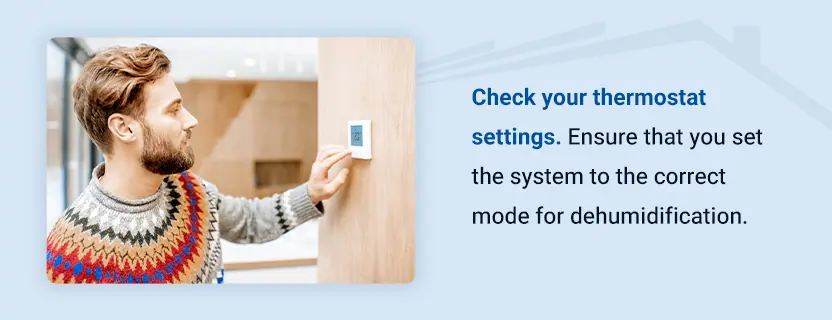
Begin by checking your thermostat settings. Ensure that you set the system to the correct mode for dehumidification. You may need to reference your manufacturer’s guide for instructions if you are unsure. Sometimes, the fix is as easy as turning on the right settings on your unit.
If you’ve been dealing with a long-term moisture issue, it may be beneficial to invest in a hygrometer that measures the humidity in your home. You can use the tool to monitor the moisture levels and see if your unit is running effectively. If not, you may want to reach out to a professional.
The air filters for your HVAC unit play an important role in how efficiently the system runs and removes humidity. Switch out your filters every one to three months to ensure your unit gets adequate airflow.
Again, using the wrong size HVAC system for the size of your home can negatively impact the unit’s ability to remove humidity and keep your space feeling good. Work with an HVAC professional to ensure the system is right for your space.
Inspect your windows, ductwork, doors and other areas throughout your house that could have air leaks. Have an expert seal these leaks to ensure they are not responsible for any excess moisture sneaking into your home.
Schedule a tune-up if you believe your HVAC unit is not effectively removing humidity from the air. There may be an unlying issue that a professional can identify and ensure the system is operating like normal, contributing to a cool, dry and cozy indoor space all year long.
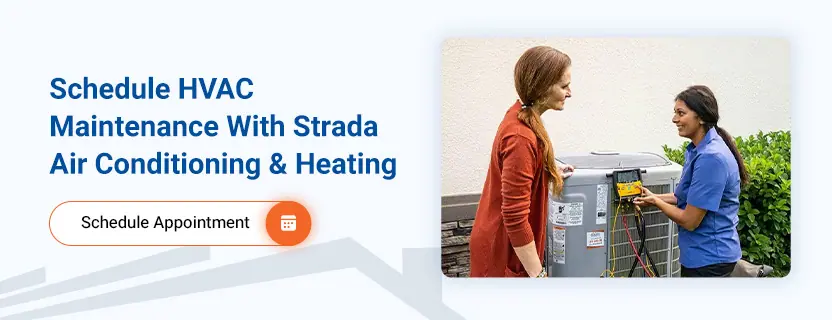
If you need HVAC service, turn to the professionals at Strada Air Conditioning & Heating. You can find one of our 41 locations throughout the Southeast in Florida, Alabama, North Carolina, Georgia, Tennessee and South Carolina.
We’ve been helping customers with quality HVAC and electrical services since 2003. Our team will help you boost indoor air quality and manage humidity levels throughout the year. Our experienced staff is here for you, whether you need assistance with your air conditioning, electrical or heating.
Are you ready to keep your space feeling comfortable? Schedule an appointment with Strada Air Conditioning & Heating online today!